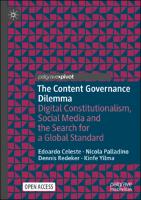The Content Governance Dilemma
Digital Constitutionalism, Social Media and the Search for a Global Standard
Author(s)
Celeste, Edoardo
Palladino, Nicola
Redeker, Dennis
Yilma, Kinfe
Language
EnglishAbstract
This open access book is one of the first academic works to comprehensively analyse the dilemma concerning global content governance on social media. To date, no single human rights standard exists across all social media platforms, allowing private companies to set their own rules, values and parameters. On the one hand, this normative autonomy raises serious concerns, primarily around whether companies should be permitted to establish the rules governing free speech online. On the other hand, if social media platforms simply adopted international law standards, they would be compelled to operate a choice on which model to follow, and put in place mechanisms to uphold these general standards. This book examines this topic from a multidisciplinary perspective, drawing from the expertise of the authors in law, political science and communication studies. It provides a carefully reconstructed theory of the content governance dilemma, as well as pragmatic solutions for companies and policymakers. In this way, the book not only benefits academics by advancing the debate on content moderation issues, but also informs new policies and regulatory strategies by offering an up-to-date overview of rules and tools for content moderation, as well as an evaluation of their current level of compliance with standards emerged in international human rights law and digital constitutionalism initiatives.


 Download
Download Web Shop
Web Shop